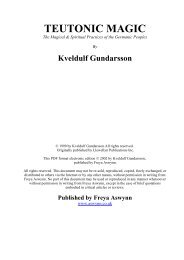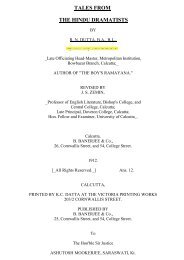Untitled - Awaken Video
Untitled - Awaken Video
Untitled - Awaken Video
Create successful ePaper yourself
Turn your PDF publications into a flip-book with our unique Google optimized e-Paper software.
Chapter 6. The Sky 149<br />
the two tribes of Gods, the Æsir and the Vanir, had led to the creation of the<br />
inhabitants of Midgard to that end, but since man nor spirit have direct access to<br />
knowledge of the entire Tree (from the Well of Mimir), they need guidance so that<br />
the proper “shaping” of the Waters (through the layering of ¸orlög) can take place<br />
ultimately preserving the Tree and, consequently, the lands of the giants, the Gods,<br />
and men. In the Teutonic mind-set, the relationship between the folk and the Gods<br />
was that each individual had some role to play towards a common goal rather than<br />
the type of relationship between a Christian and his omnipotent God who had His<br />
own separate and secret agenda in spite of His Followers.<br />
Gift-giving (blót) to the Gods was fairly common, but the concept behind it was<br />
slightly different than what the more Christian word “sacrifice” implies. Gift-giving<br />
from man to man and from man to spirit has already been described in earlier<br />
chapters and the basic format still holds true even with the Gods. For centuries, it<br />
has been understood that for whatever reason the various Gods of the northern pantheon<br />
“needed” gifts; this is a terribly poor and jaded interpretation of the concept.<br />
From the eddaic descriptions of the Gods, they already had everything necessary to<br />
their survival and those things could never have possibly been provided by man: the<br />
apples of Idunna, huge vats of mead, etc. Whatever a community or an individual<br />
was able to provide would have been but a part of a meal and a single quaff of<br />
mead for Þór. If “divine needs” were taken care of by tri-annual sacrifices, Ragnarök<br />
would have come after the very first sacrifice millennia ago because the Gods would<br />
have starved to death. The early Germanic people were pragmatists, and surely<br />
recognized early on that they were not “supporting the existence” of their Gods.<br />
The ecclesiastical question then posed above is merely an early piece of rhetoric.<br />
Gift-giving between man and God was purely a matter of honor and good-faith.<br />
Man gifted man to align himself with power/ luck in terms of lineages (see Chap.<br />
2), and man gifted a God for the same reason. A sacrifice to a God was in a sense<br />
telling the God that a community or an individual would allow themselves to be<br />
guided through this life, would work with rather than work for the God, etc. The<br />
basic format of this “gifting the Gods” really was no different than a man gifting a<br />
king as a show of faith and loyalty. And just as a warrior would give his war-leader<br />
credit for a successful raid through the composing of poetry and offering of praise, so<br />
also gave the farmer credit to Gods for a successful season. Additionally, sacrificial<br />
animals were eaten by the participants. Apparently, a sacrifice was little more than<br />
a feast planned and executed to the honor of a God or Gods, at least in the Heathen<br />
way of thinking, rather than a method for taking care of a deity’s needs.<br />
Gift-giving 10 from the Gods to man was also slightly different than the Christian<br />
10 Chapter 3, Midgard, deals with the topic of gift-giving. In this modern day, folks generally<br />
think of gift-giving as a type of "reward," but in the older philosophy based on the Germanic
















